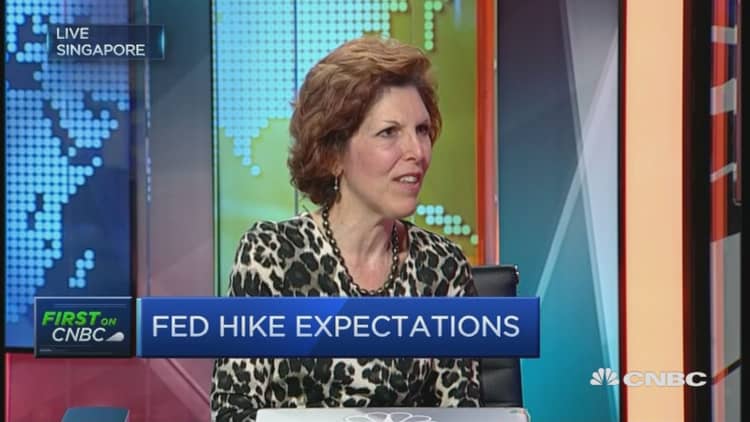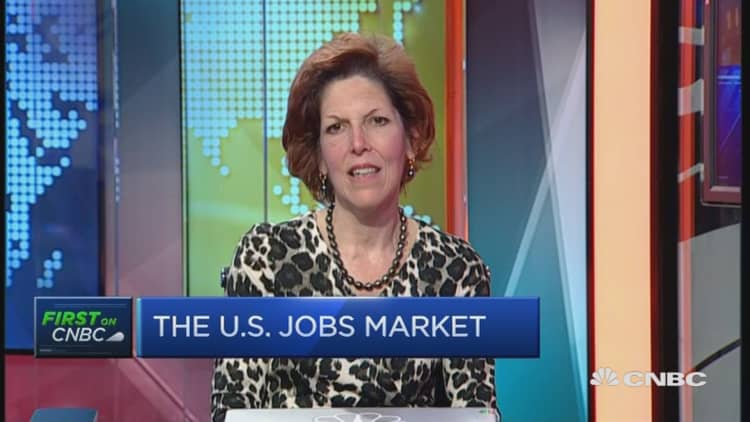
SINGAPORE — Cleveland Federal Reserve President Loretta Mester on Wednesday repeatedly emphasized she is "comfortable" with higher U.S. interest rates — even while acknowledging there are considerable uncertainties about U.S. policies at home and abroad.
Speaking with CNBC in Singapore on and off televised programming, Mester said employment and inflation data supported higher rates, but noted that the Fed would await the details on President Donald Trump's policies before considering their possible economic impact.
"I think we've made very good progress on both [U.S. maximum employment and price stability]: Inflation's not quite back up to 2 percent, but it's moving up and the forecast says that's going to continue. And from my point of view, from what the monetary policy tool can do, we're at full employment," she said.
"I'd be comfortable, if the economy continues on, for interest rates to be higher than they are now," she added, explaining that she is "very comfortable" with a path of higher rates.
Asked about the Fed's March meeting, Mester — who is not a voting member of the Federal Open Market Committee this year — said that "if the economy stays on the trajectory that it's on, I would be comfortable with having interest rates move up from where they are today."
Still, Mester told CNBC she did not believe the Federal Reserve was behind the curve for its interest rate policy, but she said economic progress means U.S. central bankers "have to" move rates higher.
But as for the projections from Fed officials, Mester acknowledged that there was uncertainty on what fiscal policy could come out of Trump's White House.
"Regardless of what time we're talking about, there is uncertainty around the outlook. That said, there is some uncertainty about what kind of policy changes the new administration is going to enact — and we don't have details of the tax changes that are being proposed — so there is uncertainty around that," she said, underscoring that those considerations are not now "the driving force" of the Fed's policy path.
In terms of weighing Trump's impact on the economy, Mester said it is "very difficult to make a projection" without sufficient details.
Still, she said that "given what we have heard so far" there will likely be some fiscal stimulus in the U.S., but Mester said she could not predict "whether it will be lasting in terms of these kinds of changes that can actually improve productivity growth or not."
The Cleveland Fed president said that she did not view that likely stimulative spending as reason enough to raise rates. In fact, she suggested that Trump's policies could cut both ways economically.
"There is some upside risk in the near term based on fiscal policy and what we've been told is going to be coming, but we haven't seen that yet. There's also some downside risk in the medium to longer run depending on what happens with immigration and some of the trade policies," she said.
"I think we have to just understand we're going to be with a lot of uncertainty for quite a long time, but that shouldn't prevent us from doing something if we're moving closer to our dual mandate goals."

Looking forward, Mester said there is a need for the U.S. to grapple with those who have lost jobs because of technology changes and globalization.
"I visited Hazard, Kentucky — a lot of coal miners there are retraining into other jobs because they have to: Those mines are not producing and they're becoming automated," she said. "So the country has to recognize that there has to be retraining."
Trump has regularly spoken of coal mining jobs as something he will defend during his presidency, but Mester expressed some doubt about the economic value of those plans.
"It's hard to see how going backward can actually improve things," she said. "We have to think about technological change — a lot of mining, if you go visit it, it's very automated — so we're going to have fewer jobs even if we bring back production. So I think we have to be very recognizing that it's not a simple thing: Keep one plant open, keep another plant open."
Looking internationally, Mester said she was hearing that many countries view the new U.S. administration's protectionist leanings as an opportunity for their nations to bolster trade.
"In some sense, if the U.S. becomes more protectionist this may be an opportunity for other countries to have freer trade and more open borders," she said. "I think there's a lot of uncertainty out there about what the U.S. policies will be — certainly uncertainty in my mind about where we're going in terms of that."


